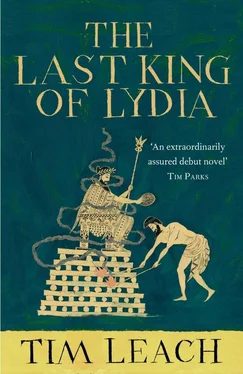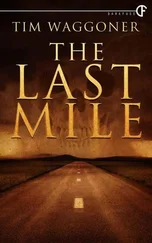Tim Leach - The Last King of Lydia
Здесь есть возможность читать онлайн «Tim Leach - The Last King of Lydia» весь текст электронной книги совершенно бесплатно (целиком полную версию без сокращений). В некоторых случаях можно слушать аудио, скачать через торрент в формате fb2 и присутствует краткое содержание. Год выпуска: 2013, ISBN: 2013, Издательство: Atlantic Books Ltd, Жанр: Исторические приключения, на английском языке. Описание произведения, (предисловие) а так же отзывы посетителей доступны на портале библиотеки ЛибКат.
- Название:The Last King of Lydia
- Автор:
- Издательство:Atlantic Books Ltd
- Жанр:
- Год:2013
- ISBN:9780857899200
- Рейтинг книги:5 / 5. Голосов: 1
-
Избранное:Добавить в избранное
- Отзывы:
-
Ваша оценка:
- 100
- 1
- 2
- 3
- 4
- 5
The Last King of Lydia: краткое содержание, описание и аннотация
Предлагаем к чтению аннотацию, описание, краткое содержание или предисловие (зависит от того, что написал сам автор книги «The Last King of Lydia»). Если вы не нашли необходимую информацию о книге — напишите в комментариях, мы постараемся отыскать её.
The Last King of Lydia — читать онлайн бесплатно полную книгу (весь текст) целиком
Ниже представлен текст книги, разбитый по страницам. Система сохранения места последней прочитанной страницы, позволяет с удобством читать онлайн бесплатно книгу «The Last King of Lydia», без необходимости каждый раз заново искать на чём Вы остановились. Поставьте закладку, и сможете в любой момент перейти на страницу, на которой закончили чтение.
Интервал:
Закладка:
‘I asked if Gyges would ever speak.’ He paused. ‘But it doesn’t matter now, knowing that we will have other sons.’
‘What did she say?’
‘She said that if Gyges ever spoke, I would regret it.’ Croesus hesitated, then shrugged. ‘I don’t know what that means.’
She nodded to herself, then left to return to her chambers. He watched her, and did not try to stop her. He waited until he was certain that she had returned to the sanctuary of the women’s quarters and would not return. He stood, and made his way down to the lower treasury.
The room was not as impressive as it had been. The gifts to Delphi had cost him greatly, and the fortress of his wealth had lost some of its former grandeur.
A part of him wished that the room could have remained as it was before: a place of glorious, unspoiled potential. Once he had seen a different vision each time he descended into the treasury. He had seen enormous theatres, vast temples and funerary mounds, fleets of trading ships that would map out every corner of the unknown world. He had dreamed an infinity of forms that his wealth might take.
Now, he saw only an army. An army of flesh and leather and iron and bronze that would spread the kingdom of Lydia across half the world. An army whose marching feet would write his name into history for ever.
He would have to be content with that.
7
Far to the east of Sardis, a village lay on the banks of the Halys river. Its clustered huts were of many different kinds, relics of all the tribes who had lived here at one time or another. Some were made from river reeds lashed together, others had been fashioned from mud or clay, others were wooden frames covered with animal hides. The fishing was good enough to support a few families, the soil too poor to allow the village to grow beyond that, and so the settlement never became larger than a village. None of the people who had ever lived in this place felt a need to give it a name, and so it did not have one.
There was only one thing that distinguished it from the many other villages by the Halys — the bridge that passed over the deep river a short distance from the huts, the bridge that at this time corresponded to a line inked on to a map. It marked the border between Lydia and Cappadocia, the easternmost point of Croesus’s empire.
It was still early in the morning, while the fishermen were beginning to lay out their nets, that the first signs came. The observant noted the birds that flocked overhead in larger numbers than usual, all of them flying from west to east. Soon after, to the west they saw a dust cloud rising as though a tornado were making its way towards them. Then, confirming what they all knew by then, they heard the steady, thudding sound of an army on the move.
The villagers acted quickly. The young men and women hid in dark corners of the huts, or in the undergrowth near the village. They pulled aside piles of rushes that concealed small buried chambers, and they secreted there all the grain, bread, and salted fish that they had. The children hid as well, and soon only the old men and women remained outside, watching the army approach.
The villagers neither knew nor cared who ruled over them. On occasion, two elders might choose to argue over whether they thought it was the Cappadocians or the Galatians to whom they might owe their loyalty. It was a debate with no consequence, to pass the long hours when there was nothing else to do. The rumour had come to the village many years before, that it was now the Lydian king who ruled them. It had been dismissed as preposterous. No one in the village could imagine that the power of that distant kingdom could ever reach so far as to affect them, yet now the forces of the Lydian king marched towards them.
The old villagers stood and stared as the army approached, waiting to see if the men would slow for a moment, if a squadron of cavalry would peel away from the main column and ride towards them. It would be the work of a moment for some squadron of the marching horde to turn aside and burn the village to the ground.
The army did not slow. They had marched past dozens of villages like this one, and each one seemed to be on the verge of starvation, populated entirely by old men and women. There seemed not a single piece of bread that could be spared, not a single young man to join the army or a young woman to entertain the spearmen, not in the entire kingdom of Lydia.
The soldiers were aware of the deceptions of the villagers, but they were well provisioned and under strict orders not to ravage the countryside. Not yet. All knew that once they crossed the river into lands that were not ruled by their king, the rules would change. Life would be worth less beyond the Halys.
The old men and women watched as tens of thousands of warriors crossed the bridge into foreign land. Armoured infantry, their faces dripping sweat beneath their heavy bronze helmets, marched beside archers and slingers who wore little apart from their weapons; Thracian mercenaries cursed thickly in their own language at the Lydian cavalry who rode beside them. Following them all, in the train of the army, rags wrapped around their faces against the thick clouds of dust stirred up by fifty thousand men, came the slaves and the supply wagons, driving vast flocks of sheep and goats with them as a living larder, the animals almost outnumbering the men who had marched before them. The people of the village, who had been unmoved by the passage of the warriors, nudged each other and stared wistfully at the passing animals, and wondered at the power of a chieftain who had so many cattle at his disposal. Here was wealth they could understand.
They watched the horde of men and animals go by and disappear over the horizon, marching towards the low-hanging sun as though that was what they sought to conquer. When the army had gone, and had been reduced to nothing but dust and sound on the horizon, the young men, women and children emerged from their hiding places, and gave thanks that they had been spared. Then they gathered up their nets and hurried to the river, competing, as they did every morning, to see who would earn the Gods’ favour by landing the first fish of the day.
They camped a day’s march beyond the Halys, sleeping on alien earth for the first time. Most men lay on the ground rolled in their cloaks, piled together around campfires in great packs to share warmth. There was only one tent at the very centre — small and simple, but a palace for this wandering band of men. Inside, next to a single brazier casting warmth and light erratically, Croesus held a council of war with his general, Sandanis.
‘Any word yet on the Persians?’ the king said.
‘Not yet, my lord.’
‘But they know we are coming?’
‘Yes,’ the general answered. ‘They have been preparing for it.’
Croesus nodded slowly. ‘And they will bring their army out to meet us in battle?’
‘Yes, my lord.’
Croesus gazed for a time at the ornate patterns of the tent wall and tried to summon some order to his thoughts. It was a strange thing, to be occupying land belonging to another. He found that he liked this sensation of gradual ownership, of conquest by possession. If he could only enjoy this feeling without the battles and the killing to come, that would have been better. But such a thing was impossible.
He turned back to his general. ‘It all seems strangely consensual, Sandanis.’
The general frowned. ‘I don’t understand.’
‘It is very accommodating, that they will bring their army all the way across the kingdom to fight us.’
‘It is the custom,’ Sandanis said bluntly. Croesus sighed, and wished again that he had brought Isocrates with the army. For all his skills as a general, Sandanis was not a thoughtful man.
Читать дальшеИнтервал:
Закладка:
Похожие книги на «The Last King of Lydia»
Представляем Вашему вниманию похожие книги на «The Last King of Lydia» списком для выбора. Мы отобрали схожую по названию и смыслу литературу в надежде предоставить читателям больше вариантов отыскать новые, интересные, ещё непрочитанные произведения.
Обсуждение, отзывы о книге «The Last King of Lydia» и просто собственные мнения читателей. Оставьте ваши комментарии, напишите, что Вы думаете о произведении, его смысле или главных героях. Укажите что конкретно понравилось, а что нет, и почему Вы так считаете.












